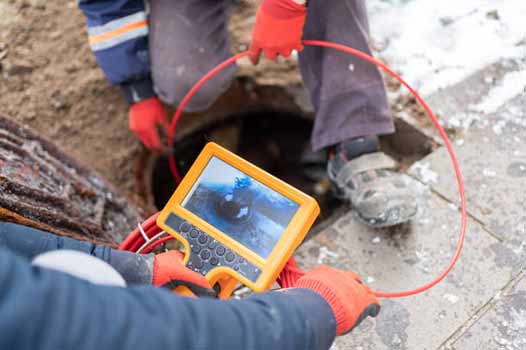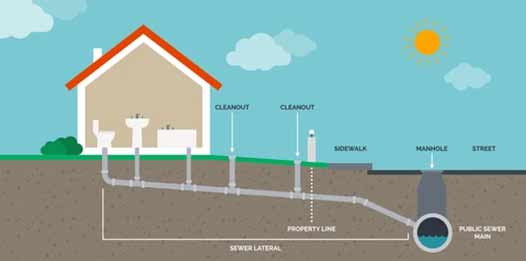Understanding Drains and Sewers: A Fundamental Difference
When it comes to property maintenance, understanding the fundamental differences between drains and sewers is crucial. While they both play essential roles in managing wastewater, their functions, responsibilities, and maintenance requirements differ significantly. Knowing these differences can help property owners address issues more efficiently and prevent potential problems from escalating. Let’s get deeper into the distinct characteristics of drains and sewers and their importance in property maintenance.
The Role of Drains in Property Maintenance
Drains are designed to remove wastewater from a single property, such as a house or a building. They carry water from sinks, showers, toilets, and other plumbing fixtures to the main sewer line. Drains are typically smaller in diameter compared to sewers and are the responsibility of the property owner to maintain. Regular maintenance of drains is essential to prevent blockages and ensure the smooth flow of wastewater. Neglecting drain maintenance can lead to significant issues, including water damage, mold growth, and unpleasant odors.
The Function of Sewers in Wastewater Management
Sewers, on the other hand, are part of a larger network that collects and transports wastewater from multiple properties to a treatment facility. They are usually managed by local authorities or utility companies. Sewers are larger in diameter and are designed to handle a higher volume of wastewater. Proper maintenance of sewers is crucial to prevent public health hazards and environmental pollution. A well-maintained sewer system ensures that wastewater is efficiently transported to treatment facilities, where it can be processed and safely released into the environment.
Common Issues with Drains and How to Address Them
Drains can experience various issues, such as blockages, leaks, and unpleasant odors. Blockages are often caused by the accumulation of debris, grease, hair, and other substances. Regular cleaning and the use of drain guards can help prevent blockages. Leaks in drains can lead to water damage and mold growth, so it’s important to address them promptly. Unpleasant odors can indicate a blockage or a problem with the drain trap, which should be inspected and cleaned regularly. Additionally, property owners should be mindful of what they dispose of down the drain to prevent clogs and other issues.
Sewer Problems and Their Impact on Communities
Sewer problems can have a significant impact on communities, leading to public health concerns and environmental damage. Common sewer issues include blockages, overflows, and structural damage. Blockages in sewers can cause backups and overflows, leading to the contamination of water sources and the spread of diseases. Structural damage to sewers can result from aging infrastructure, ground movement, or heavy traffic. Regular inspection and maintenance by local authorities are essential to prevent these issues and ensure the proper functioning of the sewer system. Communities rely on a well-maintained sewer system to maintain public health and environmental integrity.

Preventive Measures for Drain and Sewer Maintenance
Preventive maintenance is key to avoiding costly repairs and ensuring the longevity of drains and sewers. Property owners should regularly clean their drains, avoid disposing of grease and non-biodegradable items down the drain, and use drain guards to catch debris. For sewers, local authorities should conduct regular camera inspections of their sewer lines, clean the sewer lines, and invest in upgrading aging infrastructure. Public awareness campaigns can also help educate communities on the importance of proper waste disposal and sewer maintenance. By implementing preventive measures, both property owners and local authorities can contribute to a more efficient and reliable wastewater management system.
The Importance of Professional Assistance
While some drain and sewer maintenance tasks can be handled by property owners, others require professional assistance. Professional plumbers have the expertise and equipment to diagnose and address complex issues. They can perform tasks such as hydro jetting to clear blockages, inspecting drains and sewers with cameras, and repairing or replacing damaged sewer lines. Seeking professional help can save property owners time and money in the long run. Additionally, professional plumbers can provide valuable advice on maintaining drains and sewers, helping property owners avoid future problems.
Legal Responsibilities and Regulations
Understanding the legal responsibilities and regulations related to drains and sewers is essential for property owners. In many areas, property owners are responsible for maintaining the drains within their property boundaries, while local authorities are responsible for the maintenance of sewers. It’s important to be aware of local regulations and to comply with them to avoid fines and legal issues. Property owners should also be familiar with their rights and responsibilities when it comes to connecting to the public sewer system. Being informed about legal responsibilities ensures that property owners can take appropriate actions to maintain their wastewater systems and comply with regulations.
Environmental Considerations
Proper maintenance of drains and sewers is not only important for property owners but also for the environment. Blockages and overflows can lead to the contamination of water sources, harming aquatic life and ecosystems. Proper waste disposal practices, such as not pouring grease down the drain and avoiding flushing non-biodegradable items, can help protect the environment. Additionally, investing in green infrastructure, such as permeable pavements and rain gardens, can help manage stormwater and reduce the strain on sewer systems. Environmental considerations should be a priority for both property owners and local authorities to ensure a sustainable and healthy environment.
Conclusion: The Value of Understanding Drains and Sewers
In conclusion, understanding the differences between drains and sewers is essential for effective property maintenance and problem resolution. By knowing their roles, common issues, preventive measures, and legal responsibilities, property owners can better manage their wastewater systems and contribute to the overall health and safety of their communities. Proper maintenance of drains and sewers not only prevents costly repairs but also protects the environment and public health. Investing in education and professional assistance can go a long way in ensuring the longevity and functionality of these vital systems. Property owners and local authorities must work together to maintain efficient and reliable wastewater management systems, ultimately benefiting the entire community.


